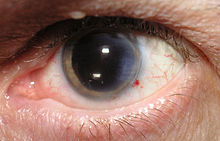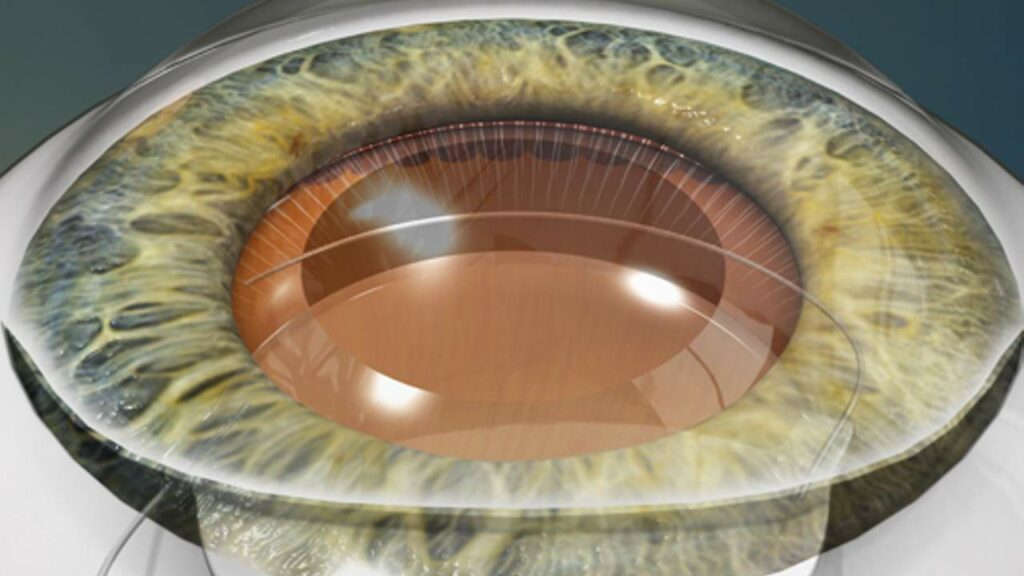If you or a loved one is suffering from cataracts, you may be wondering if surgery is the best option. One common type of cataract surgery is called extracapsular cataract extraction. In this blog post, we will discuss everything you need to know about this procedure. We will cover what happens during the surgery, how to prepare for it, and what to expect afterward. We will also discuss the risks and benefits of this type of surgery.
Contents
What Is Extracapsular Cataract Extraction?
 Extracapsular cataract extraction (ECCE) is a surgical procedure used to remove cataracts from the eye. It involves using an instrument, called a phacoemulsification machine, to break up and remove the hardened lens of the eye that has become cloudy due to cataracts. It is a type of cataract surgery that is more commonly used than intracapsular cataract extraction (ICCE).
Extracapsular cataract extraction (ECCE) is a surgical procedure used to remove cataracts from the eye. It involves using an instrument, called a phacoemulsification machine, to break up and remove the hardened lens of the eye that has become cloudy due to cataracts. It is a type of cataract surgery that is more commonly used than intracapsular cataract extraction (ICCE).
Many people who experience vision loss as a result of cataracts are able to receive improved vision following this procedure. With modern surgical techniques, patients can experience improved visual acuity, less glare, and many more benefits with this surgery.
How Does It Work?
The procedure of extracapsular cataract extraction is a slightly more complex form of cataract surgery than the intracapsular procedure. The surgeon will begin by making an incision in the lens capsule, which is then used to remove the entire lens from the eye. This allows the surgeon better access to carefully remove any pieces of the clouded lens that remain within it.
After this procedure, the surgeon will then insert an artificial intraocular lens (IOL) in place of the removed natural one. This IOL is made out of a soft plastic-like material that helps to regain focus. Lastly, the incision is closed with sutures so it can heal properly. With this procedure, patients can expect improved vision shortly after the healing process is complete.
In most cases, extracapsular cataract extraction can be done on an outpatient basis with minimal recovery time and no need for hospitalization. It is generally a safe and successful procedure, with complications only seen in rare cases.
However, if you are considering cataract surgery, it is important to consult with an experienced ophthalmologist first. This will help you decide whether this or any other type of procedure is right for you!
What To Expect From Extracapsular Cataract Extraction?
 Extracapsular cataract extraction (ECCE) is a surgical procedure used to remove a cataract from the eye. It involves removing the lens along with its surrounding capsule, which is the layer of tissue that holds it in place. There are various things you should know about the before, during, and after-surgery expectations. These include:
Extracapsular cataract extraction (ECCE) is a surgical procedure used to remove a cataract from the eye. It involves removing the lens along with its surrounding capsule, which is the layer of tissue that holds it in place. There are various things you should know about the before, during, and after-surgery expectations. These include:
Before surgery
When you are scheduled for ECCE, you will meet with your doctor to discuss the procedure and any questions or concerns. Before the surgery, you may need to have some tests done including a dilated eye exam, an ultrasound of the eye, and other imaging tests such as X-rays. You may also need to take certain medications or use eye drops to prepare for the surgery.
During Surgery
The actual procedure usually takes about 20-30 minutes. During the surgery, your doctor will make a tiny incision in the white of your eye and insert instruments to break up and remove the lens. An artificial intraocular lens (IOL) may be inserted at this time to replace the natural one. Finally, the wound is closed with sutures or stitches.
After Surgery
It is important to follow all of your doctor’s instructions for post-surgery care in order to ensure a successful recovery. Your vision may be blurry for several days after surgery and you may experience some discomfort. You will need to use eye drops regularly to help with healing. You may also need to wear an eye patch or shield for a few days. Most people are able to return to their normal activities within a week, but it can take up to 6 weeks for full vision recovery.
Overall, ECCE is a safe and effective procedure for removing cataracts from the eye. It is important to make sure you understand what to expect before, during, and after the surgery as well as how to take care of your eyes afterward in order to ensure a successful recovery.
What Are The Benefits?
If you are considering extracapsular cataract extraction (ECCE) as a treatment for your cataracts, it is important to understand the potential benefits. Some of these benefits include:
- Faster recovery time than with traditional intraocular lens implantation
- Reduced risk of infection and other complications
- Less tissue trauma during surgery
- The ability to adjust the lens power for better vision
- Reduced risk of astigmatism compared to traditional IOL implantation
- Long-term stability and clarity of vision
- Fewer postoperative visits required
These benefits should be weighed against the potential risks and complications associated with ECCE, discussed below. It is important to discuss these with your surgeon prior to making a decision about which treatment option is best for you. This might include discussing different lenses and their respective benefits.
What Are The Risks And Complications?
There are some potential risks and complications associated with extracapsular cataract extraction that should be noted. These include:
- Infection
- Inflammation
- Retinal detachment
- Increased intraocular pressure
- In rare cases, temporary or permanent vision loss can occur.
As with any surgical procedure, it is important to understand the risks before making a decision about extracapsular cataract extraction. Additionally, some of these risks may be higher in certain individuals, such as those with a history of eye problems or diabetes.
Be sure to discuss these risks with your ophthalmologist before undergoing surgery. Because the decision is ultimately yours, it is important to be aware of all possible risks and complications. Your ophthalmologist will be able to provide you with the best advice for your situation.
Is ECCE Effective Than Phacoemulsification?
 Extracapsular cataract extraction (ECCE) is a procedure that involves surgically removing the entire lens from the eye. It has been used for decades to treat cataracts, and many patients have experienced good results.
Extracapsular cataract extraction (ECCE) is a procedure that involves surgically removing the entire lens from the eye. It has been used for decades to treat cataracts, and many patients have experienced good results.
In comparison, phacoemulsification is a newer surgical technique that uses ultrasound energy to break up and remove the cloudy lens material. Both procedures are highly successful and offer excellent outcomes, but which one is better?
The answer depends on a variety of factors, including the patient’s overall health, age, and complexity of the cataract. Generally speaking, ECCE is often preferred in cases where there is significant damage to the surrounding tissue or the patient has an advanced cataract. This is because ECCE allows the surgeon to remove more of the tissue and better preserve surrounding structures, such as the capsule or iris.
On the other hand, phacoemulsification is simpler and faster than ECCE, making it suitable for most patients with a basic cataract. It can also reduce the risk of complications, such as corneal edema since it requires smaller incisions and less trauma to the eye.
Consult with a professional and get a complete evaluation to determine what procedure is best for you. Both ECCE and phacoemulsification can provide good outcomes!
Conclusion
In conclusion, extracapsular cataract extraction is a surgical procedure that is used to remove cataract lenses from the eye. It offers several advantages over intracapsular cataract extraction, including shorter recovery time and lower risk of complications. Extracapsular cataract extraction may be an ideal choice for patients looking for a safe and effective way to treat their cataracts.
Cataract surgery is a safe and painless procedure. At MantraCare we have a team of experienced eye surgeons, who will be happy to answer any questions on cataract surgery. Call us at +91-9711116605 for any inquiries.
